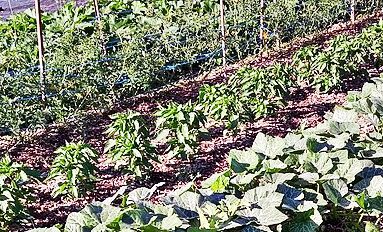I was having the best gardening season ever. My tomatoes were ripening on the vine, my zucchini was coming in by the bushel, and my herbs were fragrant and plentiful. Then one day, I came outside to find that my dog had urinated on my vegetable garden. Needless to say, I was less than thrilled. Thankfully, there are a few things you can do to minimize the damage of dog pee on a vegetable garden.
- First, if possible, move your dog’s designated bathroom area away from the garden.
- Second, always make sure to wash any affected vegetables thoroughly before eating them.
- And finally, consider using a fence or other barrier to keep your furry friend out of the garden in the future. With a little bit of care, you can enjoy a bountiful harvest – even after Fido has taken a leak in your veggie patch
So is it safe for a dog to pee on the vegetable plants? Dog urine comes out sterile but can encourage bacterial growth so use caution. See the tips below.
Is dog pee good for plants? Or will it hurt my vegetable garden?
If you’ve ever had a dog, chances are you’ve also had to deal with yellow patches of grass. Many pet owners assume that dog urine is harmful to plants, but that’s not actually the case. In fact, dog urine can actually be beneficial to plants – in moderation, of course. Dog urine contains nitrogen, which is an important nutrient for plants.
When applied sparingly, dog urine can help to promote healthy growth. However, too much nitrogen can be damaging, so it’s important not to overdo it. If you’re concerned about your lawn, try adding some extra nitrogen-rich fertilizer to balance things out. With a little trial and error, you should be able to keep your lawn looking green and healthy – regardless of how many dogs you have.
Why nitrogen is good for vegetable and tomato plants
Have you ever wondered why your tomato plants always seem to benefit from a little extra nitrogen? It’s because nitrogen is an essential nutrient for plant growth, and tomatoes are particularly heavy feeders.
Nitrogen helps plants to produce strong stems and lush foliage, and it is a key component of chlorophyll, the molecule that gives plants their green color.
Nitrogen is also essential for the production of proteins, which are necessary for cell growth. In short, without nitrogen, your tomato plants would quickly start to yellow and wilt. So if you want to keep your tomatoes healthy and productive, make sure to give them plenty of nitrogen-rich compost or fertilizer throughout the growing season.
How do I keep my dog from peeing in my vegetable garden?
If you have a vegetable garden, then you probably don’t want your dog to pee in it. After all, dog urine can damage plants and even kill them. So how can you keep your dog from turning your garden into his personal bathroom? Here are a few tips:
- The easiest way is to simply keep your dog out of the fruit and vegetable garden. If he doesn’t have access to it, then he can’t pee in it. This might mean using a fence or gate to block off the area.
- Another option is to provide your dog with an alternative bathroom spot. If he has a place where he knows he’s allowed to relieve himself, then he’ll be less likely to go elsewhere. You can create an outdoor Dog Loo or use a section of your lawn that’s not part of the garden.
- Finally, you can try training your dog not to pee in the vegetable garden. This will take some patience and consistency, but it can be done. Start by teaching him a cue like “go potty” that you only use when he’s outside of the garden. Then, every time he goes potty in the designated spot, give him lots of praise and treats. Eventually, he’ll learn that he’s supposed to go potty outside of the garden.
In Conclusion
If you’ve ever had a dog, then you know that one of the most frustrating things they can do is pee on your vegetables and good grass. Not only is it unsightly, but dog urine can also kill the grass and your tomatoes and vegetables. If you’re looking for a way to keep your dog from turning your lawn into a peeing ground, then you might want to try using a scent repellent. This is especially true if the neighbor’s dog is peeing on your garden and hard-grown vegetables.
There are a variety of different scents that dogs dislike, so you’ll need to experiment to find one that works for your dog. Citronella, lemon, and eucalyptus are all popular options. Once you’ve found a scent that works, simply spray it on the areas where you don’t want your dog to pee. The strong smell will help to keep them away.
